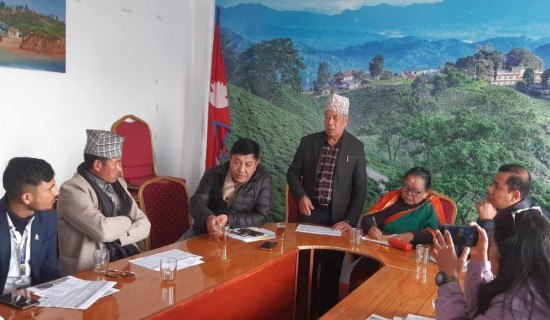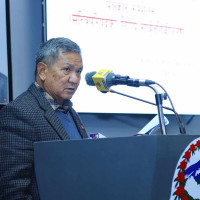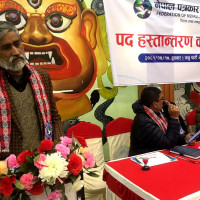- Thursday, 2 January 2025
Chinese village transformed by coffee cultivation
By Prakash Bikram Shah,Baoshan (Yunnan, China), Jan. 7: It is hard to believe that a remote village can change in a decade’s time. But it has become possible in China's Yunnan province. Xinghai, a mountainous remote village in Yunnan's Longyang district, has become the country's model village after 11 years of efforts.
It takes an hour's bus ride to reach this village near the border of Myanmar (Burma) from the city of Baoshan in Yunnan. "When I arrived 11 years ago, this village was very poor, there were no roads, no electricity, it was far behind in education and social security," said Wang Chiwai, secretary of the Chinese Communist Party in Xinghai village. "Now this village has become accessible, model and green in every way."
Wang, 56, has worked as an architect for 22 years and reached that village with the responsibility of the party. "This village was looking for a leader," he said. I have succeeded in my goal. I am still looking for ways to lead to industrialization.”
After Wang came as party secretary, he sent 51 people from the village, which has a population of 4,000 people in 550 households, to study at the university. Being far from road access, this village was also far from the access to education. Now the road has reached. Wang has also made people aware that they should read.
Just as leader Wang tried to make Xinghai village known as a model coffee settlement throughout the country, it is now known as a coffee village. He provided a well-organized road to make the coffee village a model. He made the people agree to commercialize coffee farming. According to that initiative, the annual per capita income of villagers has now increased from 3,000 yuan to over 30,000 yuan.
It is said that after the Second World War, the Myanmar army in 1951 imported coffee for the first time to Xinghai. But coffee cultivation started there from 1993. However, since for last 10 years, this village has started to be recognised as a model village for coffee.
With the efforts of Party Secretary Wang, there are now nine groups in four villages of Xinghai. These groups, including tribals and others, cultivate coffee. Those groups plant coffee on 1,600 hectares of this village and produce 4,000 tonnes a year. Seven local cooperative organizations mobilize capital for these villagers.
The residents of Xinghai village, who grow coffee Arabica in particular, sell it and bring in up to 120 million yuan a year. Similarly, 10 million yuan worth of coffee was sold online last year.
After China's National Congress passed six policies including promoting enterprise and empowering the young generation, Secretary Wang is trying to promote Xinghai village as a coffee and agricultural tourism village. So ntourists from China and other countries come to see the development of the village by mean of coffee.
Coffee and seasonal vegetables and fruits are cultivated everywhere on the slopes of Xinghai village, which has high mountains and barren terrain like Nepal. Leader Wang said, "Now, out of four thousand people here, two thousand are in coffee farming. Out of that, 1,000 people are working in coffee farming every day. Three hundred of them are coffee technicians. There are also three hundred electronic engineers in the village," he said.
From the seven cooperatives in this village, coffee distribution and sales have been supported, while the Chinese government is also supporting coffee processing, buying and selling machines. Now the price of coffee has decreased.
The farmers are hoping for an increase in the price of coffee. The government has also been sending local farmers and youth to other provinces to teach them how to cultivate coffee.
"This village was once called precipitous land by the Chinese. Oh, what a village! There are many people who say how it happened," leader Wang shared his experience.
"Now this village is famous as a coffee farm under the hill."
This village, which looks beautiful from the mountain peak, is also crowded with people taking photos. There are homestays with good facilities, so it is easy for the tourists. China's longest river Nuchiang flows a little below Xinghai village. This river from Tibet flows through Myanmar to the Indian Ocean. It is assumed that the tourism activity of the area has increased also because of the river.















